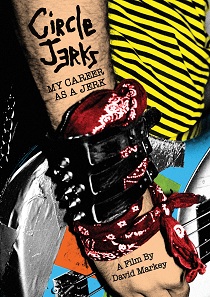At this point, I’ve lost count of how many punk-rock documentaries have an appearance by Keith Morris.
 The man has a lot of stories about the early days of the punk scene, and he just pops up over and over and over. In the recent Circle Jerks: My Career As A Jerk documentary from director David Markey (out October 23 on DVD from MVD Visual), however, he might be said to have the starring role.
The man has a lot of stories about the early days of the punk scene, and he just pops up over and over and over. In the recent Circle Jerks: My Career As A Jerk documentary from director David Markey (out October 23 on DVD from MVD Visual), however, he might be said to have the starring role.
The Circle Jerks are the seminal southern California punk act Morris formed after his stint in Black Flag with Redd Kross guitarist Greg Hetson, bassist Roger Rogerson, and drummer Lucky Lehrer. The band would go through many line-up changes, featuring members of D.O.A., Saccharine Trust, and the Red Hot Chili Peppers, amongst others.
All of the stories and line-up changes and drugs and alcohol abuse are recounted in My Career As A Jerk, and with minimal glossing-over. At no point is there any equivocation regarding who did what to whom, or who’s responsible for what problems. It’s refreshingly free of the “who said what about whom?” bullshit that tends to plague most punk docs.
There seems to be nothing less punk than a punk-rock documentary. Rather than capturing the intensity and energy of the bands being portrayed within them, punk docs usually just make a musical scene that’s still vibrant and exciting seem like nothing so much as a museum piece.
 Despite ample footage from every era of the Circle Jerks’ existence, the only point that the viewer really gets any inkling of the sheer energy inherent in their performances is when Morris describes their early practices, and how the band’s sound came together.
Despite ample footage from every era of the Circle Jerks’ existence, the only point that the viewer really gets any inkling of the sheer energy inherent in their performances is when Morris describes their early practices, and how the band’s sound came together.
The performances are wonderful, and the interviews insightful, but the film’s fatal flaw is that it ends a little too early. Were the filmmakers to address the ultimate demise of the Circle Jerks and the recent formation of OFF!, it might lend the film a sense of going forward, rather than stagnating in the past.
As it is, the end result is that My Career As A Jerk leaves everyone involved seeming to be retired ex-rockers, rather than the lively music-makers they still are.





Comments on this entry are closed.